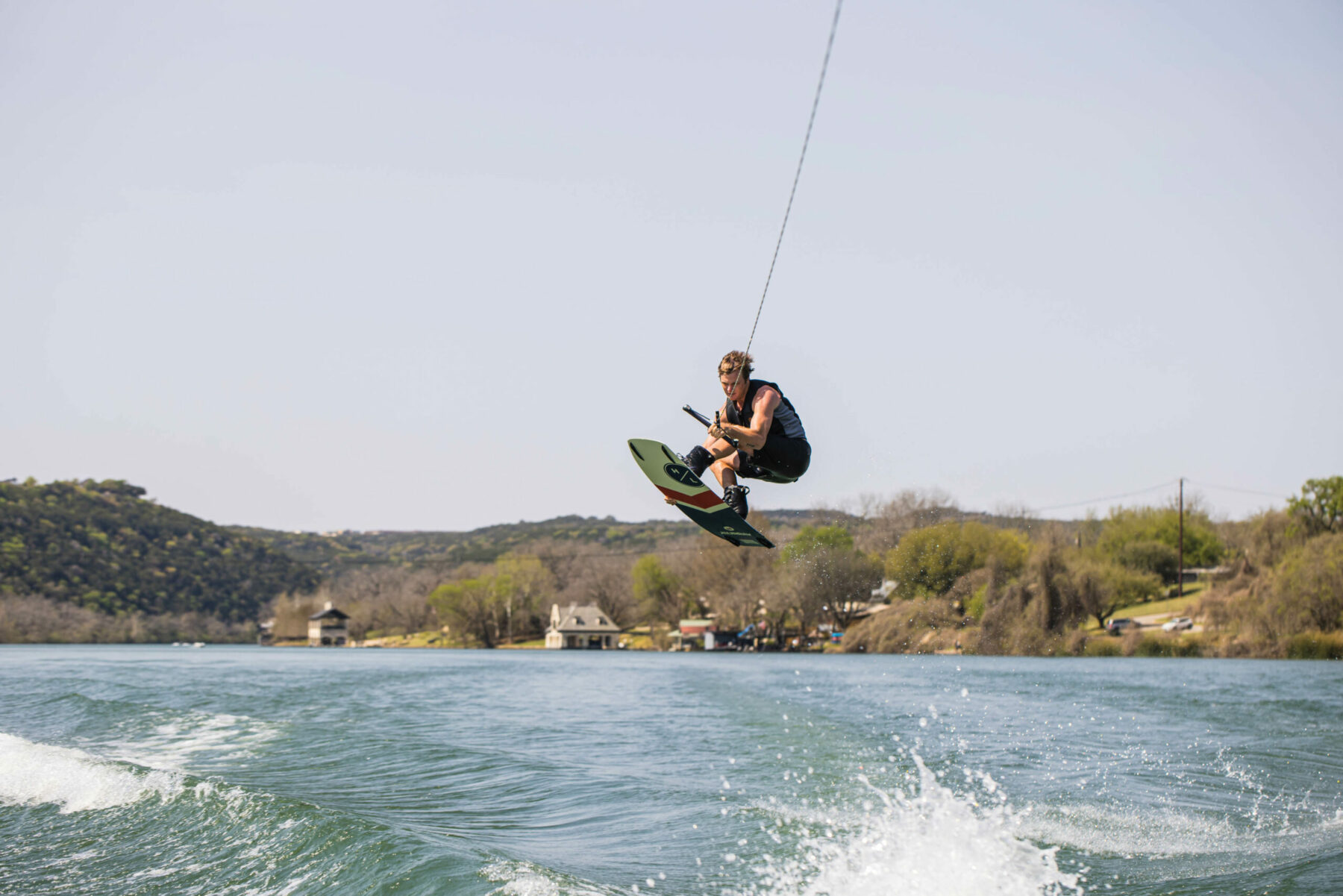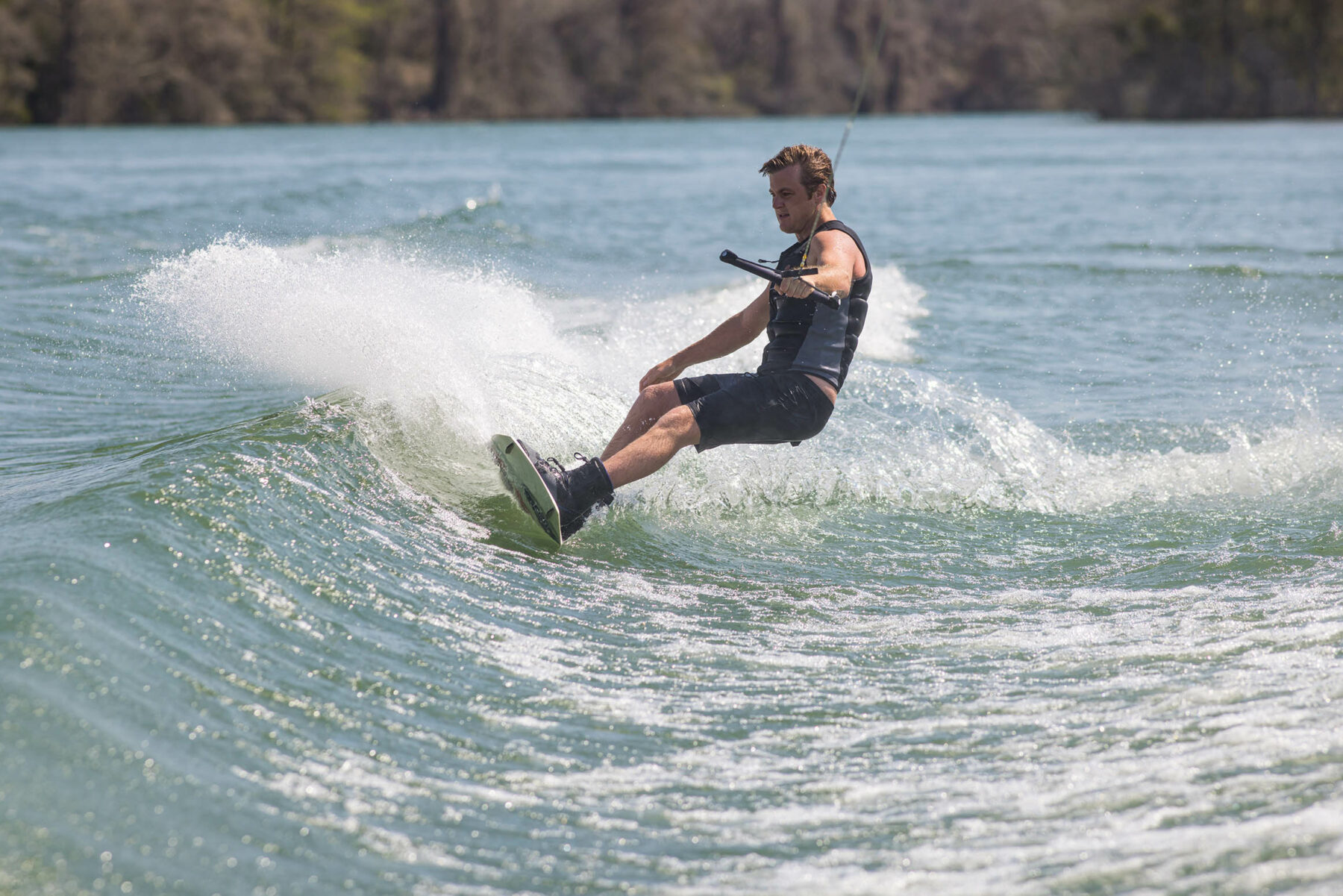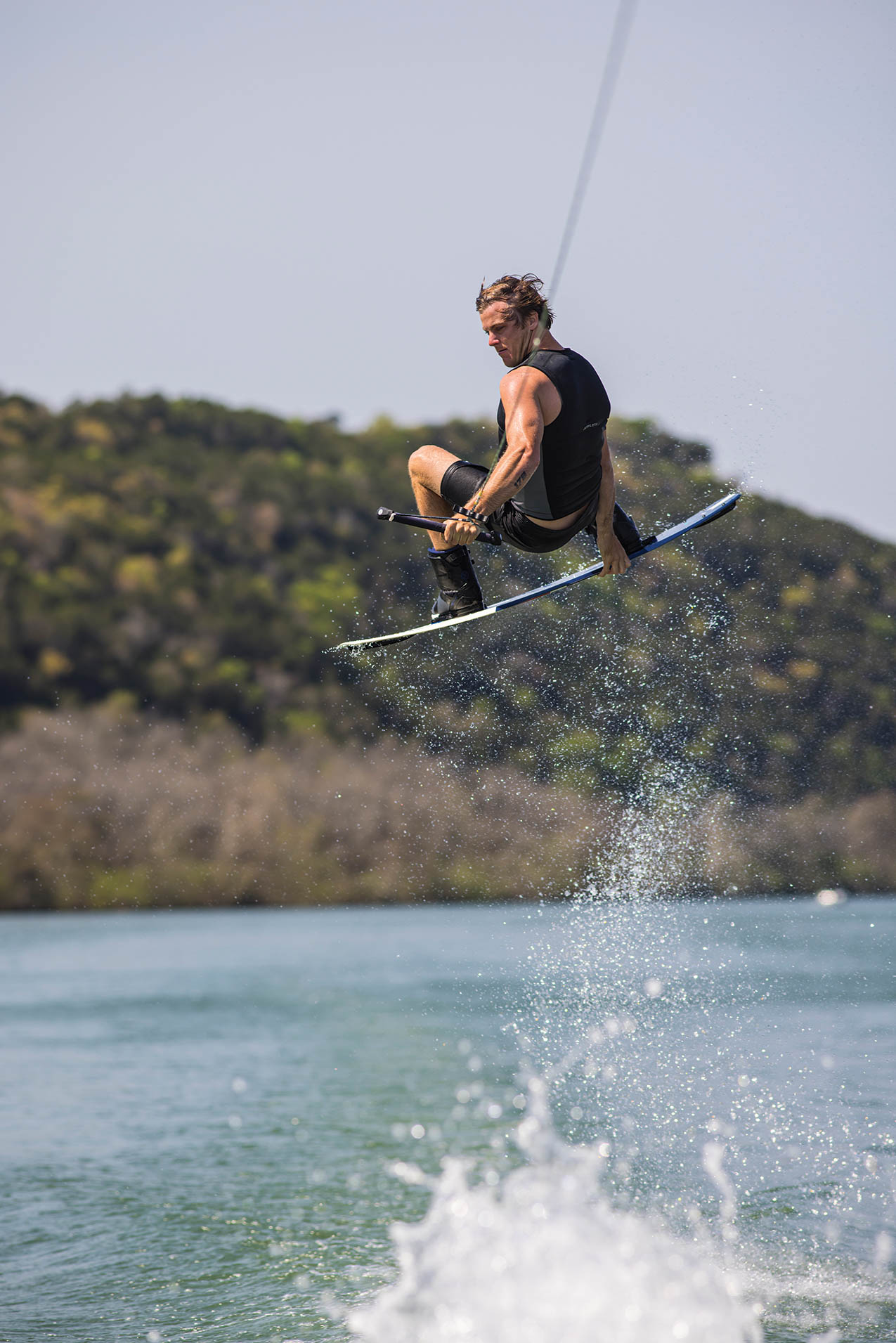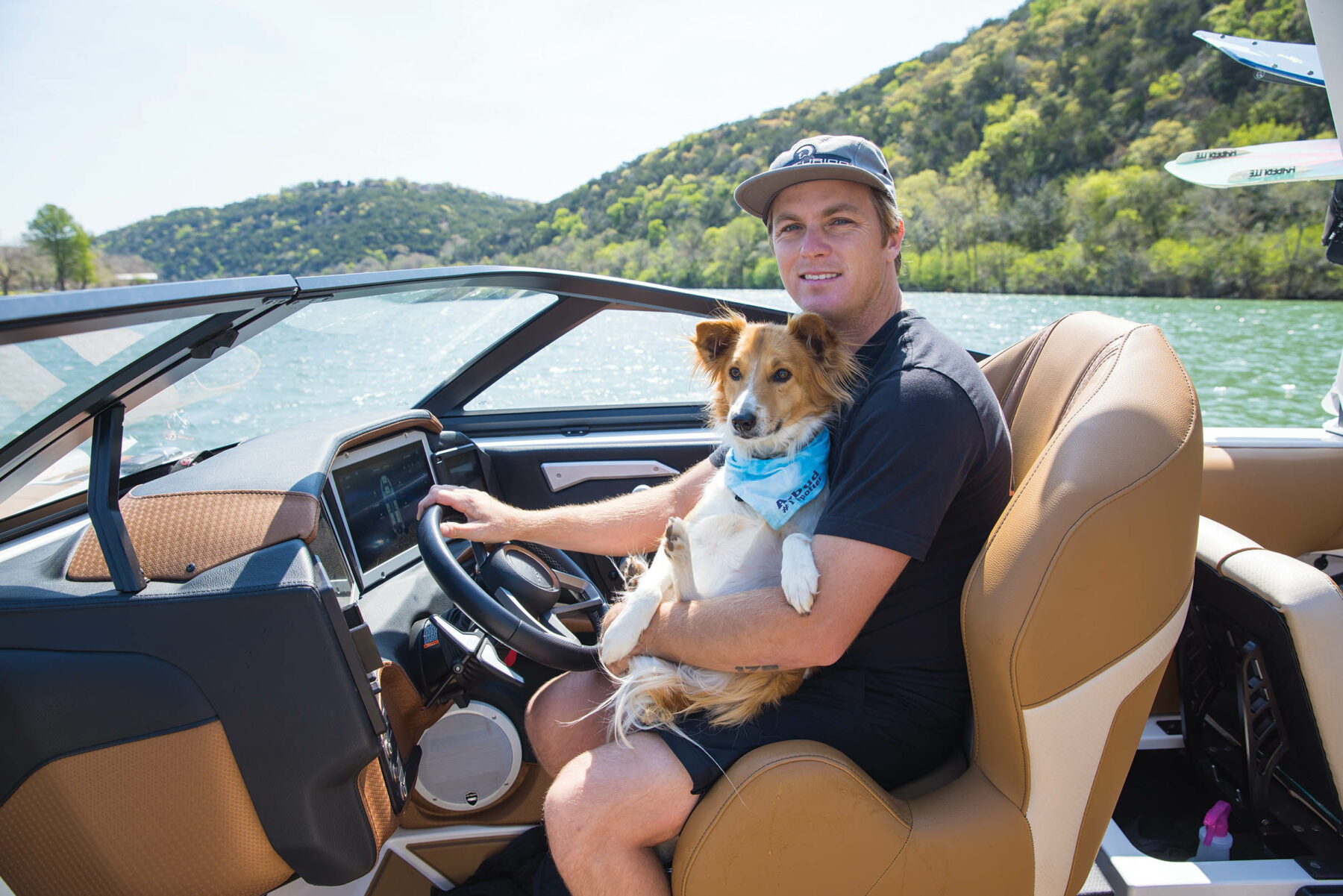A Q&A with Pro-Wakeboarder JB O’Neill

When it comes to tricks, JB O’Neill has plenty of them. As a professional wakeboarder, O’Neill is on the water most days in the summer, having fun and trying new techniques.
Born and raised in Austin, O’Neill started wakeboarding in 2004 when he and his dad tried it out on a boat that was not made for wakeboarding. Over time, as they continued to practice, O’Neill improved his skills and people started to notice him, offering to sponsor him. For the past 18 years, he has competed in many competitions, even winning a few local ones.

Though now O’Neill doesn’t compete as much, he dedicates most of his time to producing regular video content for his YouTube channel — a hub for all things wakeboarding. He hopes to bring more eyes to the sport. Today, he splits his time between wakeboarding on Lake Austin or Lake Travis and at cable parks such as Quest ATX. When he’s not wakeboarding, he plays video games, hangs out on the boat, skateboards and bikes.
AFM had the chance to speak with O’Neill about his experience and career wakeboarding.
AFM: What first drew you to wakeboarding?
O’Neill: I did all sorts of sports when I was a kid — soccer, basketball, a little bit of football in middle school, and it was really fun. But around the age of 12 (or) 13, everyone starts hitting puberty. It took me till 15 (or) 16, so I couldn’t keep up in a sport where I had to run fast. Everybody started surpassing me. So I started wakeboarding because it doesn’t really matter. You have to be strong, but it’s more about coordination.
AFM: What was your journey like to become a professional athlete?
O’Neill: From the beginning, it was all about having fun, but eventually, my dad signed me up (for) a wakeboard contest (hosted by) a local boat dealership in Austin. I went, and I looked really young. I think I was telling people I was nine or something, joking around because I’m very sarcastic. I was probably 14 when I started. Some guy at the contest was a rep for a board company and was like, “Hey, I want to sponsor you.” I didn’t believe him. Then, my parents ended up talking to him, and he was for real. So we got on a little board deal.

Since that happened, I felt like if someone’s sponsoring me, maybe I should take this more seriously. I started trying to progress and learn more tricks. At that point, whenever I started improving and getting better at wakeboarding, I almost took it too seriously. I got really mad a lot of the times when I rode and (would) just be really angry if I didn’t ride the best I could or if I wasn’t improving. That’s good for progressing, but I’ve reached a level where I’m pretty satisfied. I still like progressing, but now I’ve gone back to the whole “having fun” thing, just learning tricks here and there, and staying on the water a lot.
AFM: Do you have a favorite place for wakeboarding?
O’Neill: I have two favorite places. One is Lake Austin, but every winter until COVID started, I would go to the Philippines. In Naga City, there’s a cable car called CWC, and it’s the best wake park in the world. The weather’s always good, and it costs nothing to be there. You can hang out there for six months, essentially spend nothing and wakeboard every single day.

AFM: What do you keep in mind while wakeboarding?
O’Neill: I don’t think about much when I go. I just try to do a bunch of different tricks. If there’s a bunch of new people on the boat, (I) try and go really big to satisfy the people on the boat as well as myself. I try to have a good time. Even if I’m not running so good, it doesn’t really matter because, at the end of the day, we’re just out goofing around on the water.
AFM: What techniques do you share with newer wakeboarders?
O’Neill: Everyone wants to try so hard, or they’re trying to swim while just floating there. If it’s someone fully new to the lake, I’ll tell them to just sit there because they’ll be trying to float, but they don’t realize they’re wearing a life jacket — they’re already floating. Or I would tell someone knees bent, arms straight, stand up super slow, and that’s pretty much it. If you’re pulling on the handle or trying to be really strong, it’ll make it a lot harder.
AFM: What is the most common mistake people make when they’re starting to wakeboard?
O’Neill: The most common mistake would be by people who are really strong, like big, muscular football-type people. They’ll try so hard to get up, and they fail super hard. If you just chill out and relax, the boat or the cable will pull you up. You’re never going to beat a 450-horsepower engine. You have to find the balance between the power of the boat and yourself.
AFM: What is the biggest lesson you’ve learned through your journey wakeboarding?
O’Neill: Don’t take things so seriously. Six years ago, I was trying so hard to get sponsors and build this dream. I was almost trying too hard to where if I just chilled out a bit and became friends with team managers and more people in the industry, that can help a lot. Obviously, you still have to be good at the sport, but you also need to build relationships.

AFM: What’s your favorite thing about wakeboarding?
O’Neill: Just having friends on the boat and enjoying your time with other people. That’s the best thing about it. I’ve met a million people along the way. Every cable park has (its) own crew, so you can show up and there’s a solid 15 people there every single time, and you’ll get to know all these people around the world.
AFM: What is the hardest part about wakeboarding?
O’Neil: Now it’s going pretty good, but if I was trying to do it as a career, the hardest part would be getting budget from sponsors so you can actually live out this dream because it is really hard to get to that point. Before I had sponsors that were supporting me, I’d be eating ramen noodles every day trying to make a daily budget of eight bucks. I would ride a scooter everywhere, and riding on other people’s boats and having to chip in gas is expensive. So it’s very difficult without rich parents or something like that. The hardest part was finding people (who) believe in you and help you with a budget to do this dream.
AFM: What does wakeboarding mean to you?
O’Neil: I don’t really know what it means to me, but it’s pretty much my whole life. After the age of 14, that’s pretty much all I’ve ever thought about and (was) trying to get good at it. I don’t know how to say what it means to me exactly, but it’s kind of everything.






